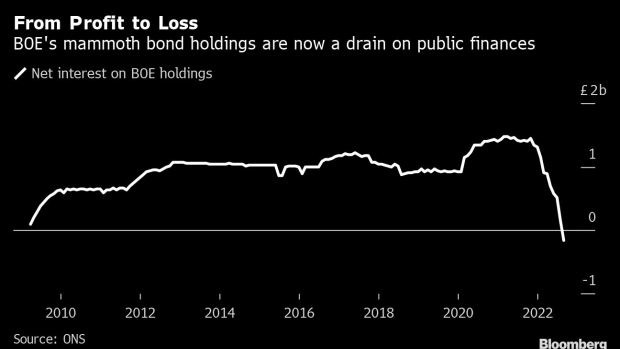Oct 21, 2022
UK Taxpayers Take First Ever Loss From BOE QE Holdings
, Bloomberg News

(Bloomberg) -- The Bank of England’s mammoth government bond holdings were a drain on the UK’s public finances for the first time on record in September, explaining why the government has had to earmark £11 billion ($12.3 billion) of cash to transfer to the central bank this fiscal year.
The loss to taxpayers last month was £156 million, Office for National Statistics figures showed Friday. That came as interest payments on BOE’s holdings totaled £1.595 billion, more than the £1.439 billion received in coupon income.
The result reversed a more-than decade-long trend where those bond holdings fed about £120 billion to the Treasury and signal a dynamic that is likely to worsen as interest rates rise and the BOE begins selling its bonds next month, Bloomberg calculations suggest the BOE’s annual loss, which the Treasury has promised to pay, could top £20 billion as soon as next year.
The government is set to transfer more than £11 billion this fiscal year to the BOE to cover projected losses in its bond-buying program for the next six months, according to an update to the “Central Government Supply Estimates” published on Tuesday by the Treasury. An initial £828 million already been transfered.
Read More: UK Treasury to Transfer £11 Billion to BOE to Cover QE Losses
September’s shortfall in the public finances come at the worst possible time for a government trying to find large savings to balance the books in the wake of a disastrous budget last month that ultimately cost Prime Minister Liz Truss and her Chancellor Kwasi Kwarteng their jobs.
The loss stems from the design of the BOE’s bond buying under its quantitative-easing program, where the central bank bought bonds in financial markets to stimulate the economy and limit interest rates. As part of the £895 billion QE program, an equivalent amount of reserves were created in the form of deposits held by commercial lenders at the bank.
The central bank pays interest on those reserves at the current bank rate. Initially, the cost was more than covered by income earned on government bonds bought by the BOE with the money it created.
That equation has changed now that interest rates have now risen to 2.25%, higher than the average coupon income on the gilt portfolio. If the BOE’s key rates hit 5% next year, as markets currently expect, interest payments on holdings will be close to £40 billion, according to Bloomberg calculations.
The spiralling cost has led to speculation the government may consider changing the rules of the plan to mitigate the hit. The Treasury denies that tweak is coming.
Coupon payments will offset less than half the interest paid, while selling bonds will also likely incur extra losses as prices are currently much lower than they were bought for. The recent fall in bond prices has left the remaining the £838 billion portfolio of gilts carrying a market loss of about £200 billion.
Forecasts by the Office for Budget Responsibility, also based on market expectations, will lay out those costs alongside the government’s next fiscal statement. The final numbers will be impacted by how the OBR treats the BOE’s plans to sell its holdings of gilts.
©2022 Bloomberg L.P.





